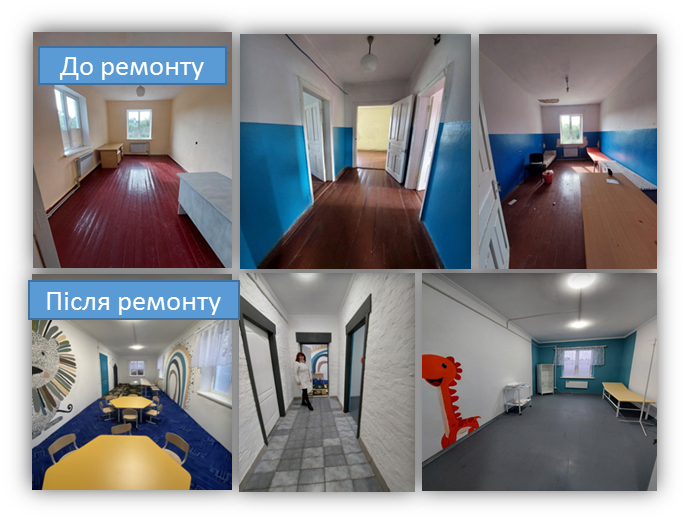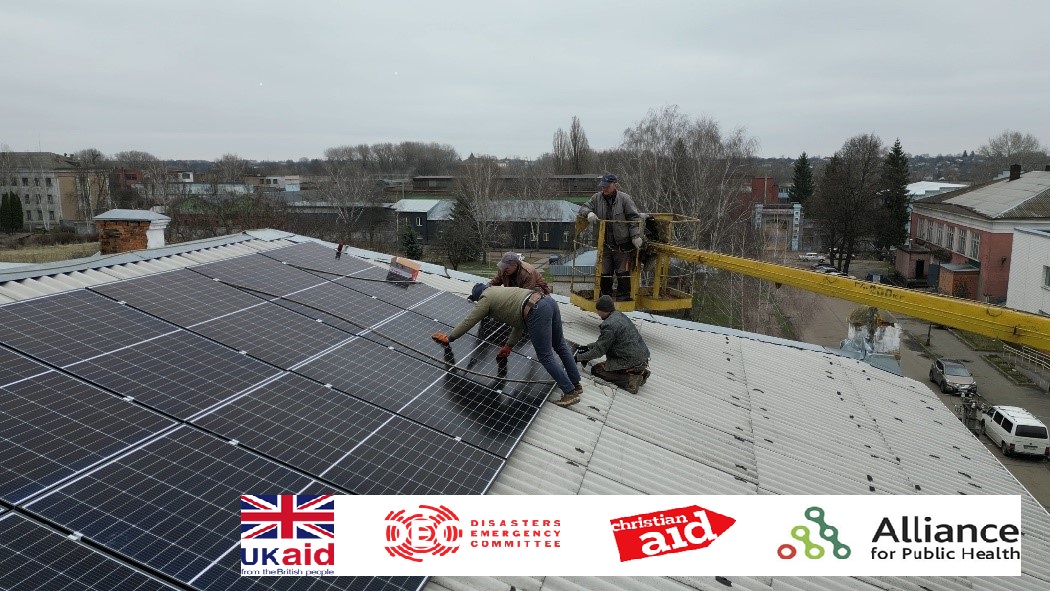Thanks to a new approach to working with communities, people have the opportunity to initiate solutions to their priority needs through the donor funding
For almost a year and a half, a full-scale war has been raging in Ukraine. According to the official data, more than 15 million Ukrainians were forced to flee their homes as internally displaced persons (IDPs) or refugees in the first 12 months, the largest population movement in Europe since World War II. These figures illustrate the unprecedented humanitarian crisis faced by Ukraine, which is making incredible efforts to defend its sovereignty and democratic values.
Since the very beginning of the war, a significant number of volunteer and local religious initiatives have responded to the humanitarian crisis caused by Russian military aggression. In July 2022, the Alliance for Public Health, with the support of Christian Aid, launched a pilot crisis response program in Ukraine involving people affected by military aggression. This approach implies the involvement of community initiative groups and communities in a mini-grant contest to effectively unite and address urgent humanitarian needs and to support their vital initiatives. The activities are carried out within the framework of the project “Integrated Humanitarian Response in Conditions of War and Post-War Reconstruction”, which results in the provision of humanitarian and social assistance, medical, psychological and legal counselling.
Community initiatives are supported by microgrants
 “Thanks to the implementation of the Rukavychka project – a warm and safe night at a police checkpoint for those in need – we managed to equip 7 police checkpoints and create overnight accommodation for people. The facilities are equipped with electric generators, heaters, folding beds, tables, benches, hot drink machines and chairs for a comfortable stay. This made it possible to help more than a hundred people who fled the occupied territories and had no housing, as well as those who, due to the lack of light, electricity and heating, did not have the conditions to spend the night at home,” says the Melitopol Volunteer Group “PATRIOT”, which participated in the mini-grant competition and won funding to set up seven “Points of Invincibility”, which operate around the clock and are free to people who stay there temporarily.
“Thanks to the implementation of the Rukavychka project – a warm and safe night at a police checkpoint for those in need – we managed to equip 7 police checkpoints and create overnight accommodation for people. The facilities are equipped with electric generators, heaters, folding beds, tables, benches, hot drink machines and chairs for a comfortable stay. This made it possible to help more than a hundred people who fled the occupied territories and had no housing, as well as those who, due to the lack of light, electricity and heating, did not have the conditions to spend the night at home,” says the Melitopol Volunteer Group “PATRIOT”, which participated in the mini-grant competition and won funding to set up seven “Points of Invincibility”, which operate around the clock and are free to people who stay there temporarily.
Between July 2022 and May 2023, 203 community groups in 20 regions of the country were supported with 203 microgrants totalling over £415,000 and reaching over 41,769 people. The approach focuses on the natural creativity and capacities of the crisis-affected communities to encourage and support them in identifying and implementing the initiatives that help improve their immediate well-being, address the root causes of the crisis in a timely manner, and strengthen their long-term resilience by enhancing a social cohesion.
 An initiative group from the village of Zastuhna in the Kyiv region was able to equip a room with furniture and other equipment to host various children’s clubs, workshops, and create a space for children to learn. In addition, a medical office has been opened in the equipped room, where residents can receive free medical services. “Our initiative group cares about the improvement of wellbeing of the village, constantly compiles lists of needs, identifies new problems to be solved, and sets ambitious goals. We are very pleased that in such a difficult time for the country there are social projects that help improve the lives of vulnerable people,” says Tetiana Pasichnyk, Zastuhna village head.
An initiative group from the village of Zastuhna in the Kyiv region was able to equip a room with furniture and other equipment to host various children’s clubs, workshops, and create a space for children to learn. In addition, a medical office has been opened in the equipped room, where residents can receive free medical services. “Our initiative group cares about the improvement of wellbeing of the village, constantly compiles lists of needs, identifies new problems to be solved, and sets ambitious goals. We are very pleased that in such a difficult time for the country there are social projects that help improve the lives of vulnerable people,” says Tetiana Pasichnyk, Zastuhna village head.
A recent real-time evaluation by the international faith-based organization ACT Alliance found that this participatory approach involving people and community groups is a best practice to support and strengthen humanitarian localization plans in Ukraine.
People are focusing on their primary needs
Only those people affected by the crisis have a clear understanding of the resources, difficulties and opportunities of their own communities. According to the results of the mini-grant contest, the community initiative groups most often indicated the absence or lack of funding for the following areas: construction of communal bomb shelters; repair of evacuation vehicles; preparation of elderly people’s homes for winter; reconstruction of water towers; installation of wood stoves in elderly people’s homes and schools; equipment of children’s playgrounds and creation of safe spaces for children; allocation and arrangement of laundry facilities for IDPs; purchase of kitchen appliances for shelters where they would be able to cook independently; and many other services.  “We conducted a study of the state of nutrition in different social groups and identified certain problems, such as the lack of fresh vegetables and fruits, the inaccessibility of healthy food due to economic reasons, etc.,” said the employees of the Renaissance Foundation. ” As a result, in the short term we provided 40 IDPs with quality and healthy food, and in the long term, we created comfortable living conditions for them in the shelters and “safe places” with the option to cook their own food themselves.
“We conducted a study of the state of nutrition in different social groups and identified certain problems, such as the lack of fresh vegetables and fruits, the inaccessibility of healthy food due to economic reasons, etc.,” said the employees of the Renaissance Foundation. ” As a result, in the short term we provided 40 IDPs with quality and healthy food, and in the long term, we created comfortable living conditions for them in the shelters and “safe places” with the option to cook their own food themselves.
The need for power generators was the result of Russian missile attacks on Ukraine’s energy infrastructure and, at present, the need to purchase them remains quite urgent as the war continues and new destruction occurs every day. The NGO ProLife Ukraine purchased and handed over several electric generators and fuel coupons for the generators to the Buchach Communal Enterprise, which helped to provide water towers with electricity to ensure uninterrupted water supply in the areas where about 2000 people live, 500 of whom are IDPs.
Also, thanks to participation in the mini-grant competition, Konotop City Territorial Community received a 5 kW hybrid solar power plant to meet the needs of the IDP Support Center, which is home to almost 3,500 people. This helped to strengthen the community’s capacity to respond to the electricity supply crisis by creating a place of “energy security”, which is important for residents as it makes them feel more secure and reduces their psychological stress.
 Another striking example of meeting the urgent needs of the population, including IDPs, was the creation of a space for children with special educational needs, where 120 children received free psychological and correctional services over the course of the year. “Not only children with special educational needs need psychological and correctional help, but also those children who have experienced stressful situations. These children include most of the displaced children who came to Vinnytsia from the occupied territories or from the war zones,” the specialists from the FIDES Psychological Centre said. The funds were used to purchase the necessary equipment and teaching materials, as well as to create the right conditions for free classes for children. In just three months, 40 group and 60 individual sessions were held there.
Another striking example of meeting the urgent needs of the population, including IDPs, was the creation of a space for children with special educational needs, where 120 children received free psychological and correctional services over the course of the year. “Not only children with special educational needs need psychological and correctional help, but also those children who have experienced stressful situations. These children include most of the displaced children who came to Vinnytsia from the occupied territories or from the war zones,” the specialists from the FIDES Psychological Centre said. The funds were used to purchase the necessary equipment and teaching materials, as well as to create the right conditions for free classes for children. In just three months, 40 group and 60 individual sessions were held there.
Over the course of the project, we have seen that microgrants enable community groups to quickly address their most pressing needs and seize the existing opportunities in their communities. All ideas for the implementation of certain initiatives come exclusively from the communities or individuals, which confirms the uniqueness and importance of this approach. We have witnessed countless examples of spontaneous local actions aimed at overcoming the consequences of the war in Ukraine. It is time to actively support people who intuitively work to meet the needs of the community as a whole.
Reflecting on how the civil society has strengthened over the past year, the Alliance has reported that it was a good start, but that there is still much work to be done. Much of this work is about creating the space, opportunities, structures and resources to enable local actors, including community groups and local organisations, to act on their ideas.
Additional Information:
The Alliance for Public Health is implementing the project “Integrated Humanitarian Response in Conditions of War and Post-War Reconstruction” with the financial support of the Disasters Emergency Committee (UK) and with the technical support of Christian Aid. The main goal of the activity is to support communities to meet urgent humanitarian, social and medical needs and to live in dignity even in crisis conditions.

